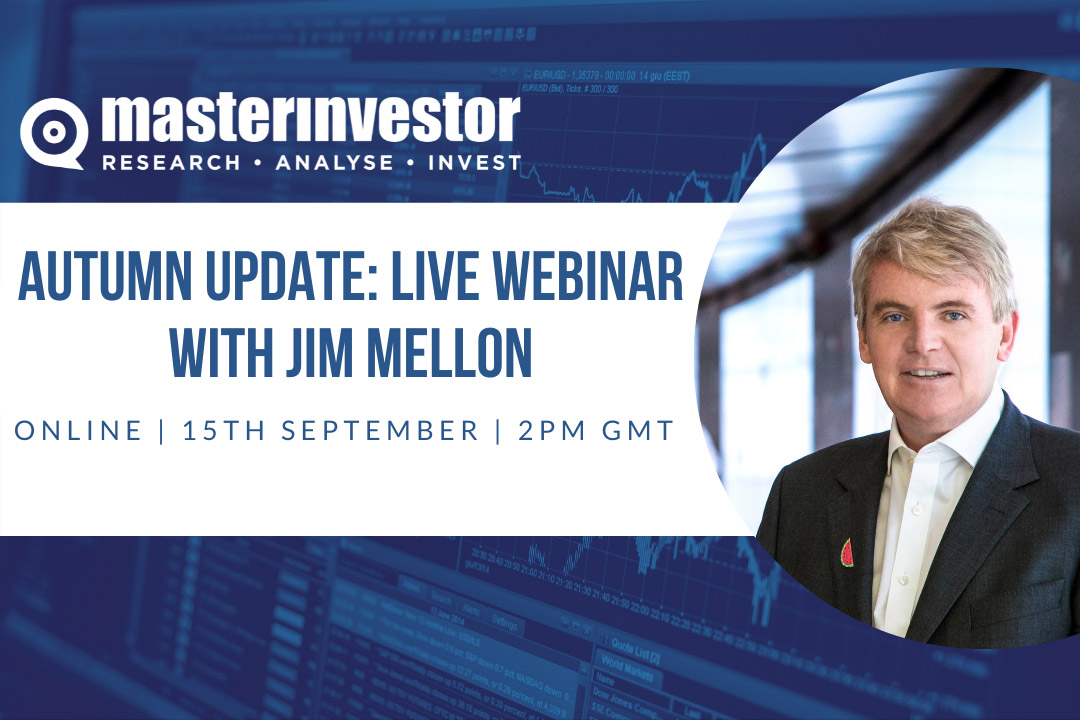Mellon on the Markets: An Overheated Summer

It is late summer in Ibiza but still too hot for me; I’m longing to go back to more temperate climes. In fact, a bit like the market, still too hot and sweaty for its own good, with the big US tech firms now clocking in at US $10 trillion of market capitalization – which, by the way, is about half the size of the US economy and four times the size of the UK economy. This is clearly madness and at some point it will change. For now, I am avoiding trying to time the falling knives on the short side, as I still bear the scars of earlier attempts to forecast the stock market demise of tech.
However, I imagine that a lot of Master Investor followers will have done well by buying some of the old “value stocks” that got hammered in the early stages of the pandemic, and which have now yielded us really good returns. Stocks like Lloyds Bank which was, in my missives earlier this year, my prime position. Stocks like Marks & Spencer, which have confounded the sceptics and done really well. And of course, BT which has benefitted from not just being absurdly cheap but also been the focus of a French raider’s attention.
I’m speaking at an MI webinar in a couple of weeks, but I wanted to update you on my latest views in advance. Some of this will sound like a broken record, but some is new – and I hope interesting.
Readers of the news in the last couple of weeks would be forgiven for thinking that the only things happening in the world were in Afghanistan – that cockpit of eternal conflict – and in the pen of poor Geronimo the alpaca. There is, however a lot more going on that is of interest to us as investors – and in fact, one geopolitical development which will reshape markets.
A Chinese Crunch?
This most important of the geopolitical developments is in China. Luckily, I don’t have a lot there, and even then it’s through low exposure Asian funds. So the question is if it now time to buy the Middle Kingdom. I think the answer is no.
The Chinese started a campaign of “common prosperity” a few weeks back and began by ominously moving private tutorial companies (some of which were listed in the US and valued at multiple billions) into what are known as “common goods” – i.e. nonprofits. Some shares in this sector have subsequently fallen by 95%.
Then the Chinese Communist Party trained its guns onto the big Chinese tech companies- Tencent, NetEase and the rest (Alibaba had already been put in the sin bin), and their valuations have been crunched. This reflects the CCP’s sudden desire (I guess the name of its politics would suggest this strategy), to reduce inequality. These companies have been “encouraged” to make more of a (monetary) contribution to society at large, so QED, their profits will fall – and hard.
Additionally, the amount of time that minors will be able to devote to the thoroughly useless pastime of video gaming has been constrained severely, putting further pressure on the tech giants.
Personally, I say: good for them! It might be a raw deal for the shareholders, but its good for China. Too much of its economy- and of ours – are biased towards the fripperies of online addiction, which also creates yawning and potentially dangerous gaps in wealth.
This is a serious issue, and while the moves made so far by the CCP might seem to be confiscatory and biased against Western shareholders of the Chinese internet giants, we in the West have actually done the same, but mostly in other sectors. Think of special bank taxes in the past thirteen years, think of “punishment “taxes on oil and gas companies, and think of the EU’s righteous campaigns against some of the tech giants from the US.
The methodology may be flawed , but the outcome is wise. Too much power in the hands of tech companies is not good for any society. My friend Bill Blain, a veteran market commentator, suggest that similar, if not as clunky, action may await the big US tech giants so now is the time to flee. Don’t let China’s warning beacon leave you exposed to the same thing in the West. Its coming and the results will be brutal. However, wait for them to start losing momentum before pouncing on the short side. If you own them now, sell them.
Is this the end of Pax Americana?
And speaking of correct outcomes but ineffective execution, lets turn our gaze back to Afghanistan. I think Biden is right to get America (and where it goes, we all dutifully and necessarily follow) out of there, but surely there was a better way of doing it.
As investors, however, this presents us with an opportunity. Defence! There is no doubt that the lack of pre-consultation with allies, before America’s abrupt withdrawal has put the wind up NATO. This applies in particular to those members who spend diddly squat on defence, preferring to shelter behind America’s previously impervious umbrella.
Those days are gone. Does anyone seriously think that the Baltic states will be protected by NATO in the event, say, of a Russian “rescue” of Lithuania? I personally very much doubt it. What about Taiwan? Will the US risk nuclear oblivion to protect Taiwan from an invasion from China? I doubt it. The days of Uncle Sam being the hegemon riding to the rescue are likely over.
So what is going to happen is that every country in harm’s way is going to ramp up defence expenditure. That’s the reason that predatory companies are trying to snap up UK defence, such as Ultra, at a rate of knots. They are cheap and they are on the cusp of a huge boom.
I doubt the UK will allow the acquisition of fallen angels such as Babcock, BAE Systems, or Rolls Royce (less exposed to defence than the others) , but these businesses are at the early stage of a rearmament boom such as the world has never seen. Those Baltic states, Taiwan, countries in the Middle East, Germany- and many others- are all going to be donning armour and shields for at least a decade, so now is the time to load up on them.
And of course, there are great US companies such as Lockheed Martin and Northrop Grumman to consider as well.
I think the risk of conflict is quite low, but if someone is burgled in the neighbourhood, it stands to reason that you sign up to the security company. Formerly, that was NATO, but it, like the forces in Afghanistan has been sidelined by the world’s most important power, which is in understandable retreat. If you’ve been paying the security bills for decades and get little credit, why bother anymore?
So, defence looks like a good bet to me.
I, along with my chum Will Nutting, am a huge bull of Tesco. Ten times cash flow, 4.5% dividend yield, lots of assets, huge online and physical presence – and absolutely not too big to be acquired. It also has an open share register, and is not a “national interest” story.
Methinks 30% up in a year. That’s worth having in an environment of really low returns and exploding inflation.
Which of course, underlines the need for gold.Keep the faith in the yellow metal, and Happy Hunting.
Jim Mellon
September 2 2021

Just finished your Zoom meeting
You have inticed me to invest more into AGRONOMICS
I really have to thank you for giving us your time and insights in this way.
Over the last year your sharing has increaced my net worth by 2%
Which for me is a wonderful time on the Greek Islands for 3 months this summer
God bless
Big Tech is the long arm of the state – a data conduit for the central planners.
As such, the deal is that they won’t be taxed much nor be restricted in size.
In return Govt get data on demand. And so much easier when you can just go to Google, Microsoft, Apple, Facebook et al rather than hundreds of smaller players. That would be chaotic for the intelligence agencies.
No, Big Tech suits them fine.